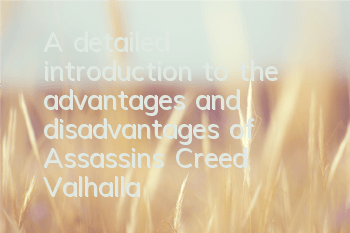First, as usual, thanks to Ubisoft for the pre-sales experience opportunities provided. Secondly, I would like to apologize to readers and players who want to share the game experience as soon as possible. That is, I obviously got the game about a week in advance, but for various reasons, I was unable to fully experience the entire content of this work before the release. In fact, I still did not pass the level until the date of writing this article. Of course, there are my personal reasons for this, but I must say that the more important reason is from the game itself - this part of the explanation will also be a very important part of this article, because it will be directly related to my evaluation of this game.
The first and foremost one very direct reason is that this game is really long. I currently have about fifty hours of game time. Judging from the existing signs, I should have only completed about 50% of the main line process. And I realized that if I continue to follow my usual AC series gameplay (try to clear the landmark events and collections passed on the main route, do some contract tasks in moderation, etc.), the pass time will obviously be easier than 100 hours at a time. If you use the licking method of "completely sweep one area and then go to the next area" to play the game, this time will further reach a more exaggerated number.
So please make sure that this article is not a sharing after a complete experience of the game. All the introductions and comments below are also based on the depth of experience such as "50 hours", "170 character strength", and "5-level base". After I truly complete the entire game, I will further supplement it in other ways (such as radio or video) and it is not ruled out that some of the views may change.
We can clearly feel the content and huge scale of the game, that is, even for Ubisoft, which is mass-produced large-scale open-world games, Assassin's Creed (hereinafter referred to as AC) is definitely treated as a flagship IP. You will find almost all the changes and mechanics that have been verified before in other games in Assassin's Creed Valhalla. Or in other words, we can even think that the AC series can be used as a yardstick for "Ubisoft Open World Games", representing the position that this assembly line could reach at that time.
For example, the base construction system is a very good mechanism to connect character growth with open world exploration that has been verified in "Far Cry New Dawn". We can see that at this point in the transition period, this system has been expanded to new generation games such as "Watch Dogs Legion" and "Assassin's Creed Valhalla". Of course, we cannot deny that whether it is "everyone is a hacker" or "conquering England", the themes and characteristics of these two works are also very suitable for this system. However, after the AC series introduced more traditional RPG elements, base construction is not so directly related to the growth and strength of the character in this work, and more are providedCustom content expansion, such as character hairstyles and tattoos, various appearance options for the long boat, and mount appearance, etc.
In terms of character growth system, there have been some adjustments compared to the front seat "Assassin's Creed Odyssey" and Montreal's own last AC "Assassin's Creed Origin". First, the traditional character level and dynamic enemy strength were cancelled, and instead given the character a "strength" indicator. Every time the experience value is full, the player is given two skill points. Every time a little skill is used, the character strength increases by 1 point. This change may seem to be suspected of changing the soup or not changing the medicine at first glance, but in fact it is indeed different.
Because first of all, the increase in intensity does not bring about a comprehensive improvement in character values, in the new skill tree composed of cool zodiac charts, there is only one of the truly active or special effects "skills" in each zodiac - that is, the large skill area - that is, the "skill" that is truly active or has special effects, such as continuous assassination or adding an adrenaline slot. The several nodes connected between these skills are composed of passive effects that bring a small amount of improvement, such as increasing a little light attack damage, a little defense or a little flame or poison resistance. This means that even if your equipment and other aspects have not been improved, even if the character's strength increases by more than ten or twenty or even more, there will be no overturning intensity changes. As long as the strength is not too different, there will be no complete crushing or no fight. I have tried to defeat the XX person with a suggested strength of 90 (similar to the front seat) when the intensity is only about 40, and also tried to rob a monastery with a suggested strength of 160 when the intensity is more than 50.
I believe this is an adjustment made to market feedback after the first two works introduced the deep RPG numerical system. Personally, the effect brought by this change is quite positive. After trying, the AC series has found a more appropriate balance between improving the core gameplay and its own theme characteristics. Because we all know that although dynamic strength can roughly solve the contradiction between the numerical-driven kernel and the open-world gameplay, this mechanism itself conflicts with the more serious gameplay of character development.It will eliminate a considerable part of the fun brought to players by character growth in this type of game, which is a last resort. In "Assassin's Creed, Valhalla", the game can finally get rid of the constraints of dynamic strength, allowing the game to ensure a relatively comfortable numerical curve while the enemy strength in each area is fixed.
Then with the disappearance of the level, the equipment level will also disappear. Weapons and equipment no longer have natural levels and quality differences, and you will no longer constantly obtain a large number of the same weapons of all levels and quality as you did in the previous work. As Ubisoft said in his own introduction to the equipment system, every weapon and equipment in the game is unique and unique.
In fact, it is simple and easy to understand, it is similar to the equipment system of the "Dark Souls" series, and each weapon is unique and can be upgraded to the highest quality. Of course, in order to avoid the trouble of upgrading from the primary level, many weapons you get are not primary level when you get. Moreover, the more weapons you get later, there will definitely be some natural "physical" foundation, or some better unique effects. But overall, just like the Soul series we are familiar with, in theory, you can strengthen and use whatever weapon you like, and the same goes for armor.
The improvement of the basic value of the character is also provided by the upgrade of equipment. So in principle, you can try to collect some advanced enhancement materials on the advanced map with more strength than your current strength, and then upgrade the weapon to a relatively high quality to obtain a suppression effect within a certain period of time. However, I just said that the mechanism of this equipment system is similar to that of Dark Soul, but it is not Dark Soul after all. I personally think there is no need to play Assassin's Creed in this way.
Another important change in character growth is to split the active skills that consume adrenaline from the skill tree and make it a collection element called "Book of Knowledge". The advantage of doing this is that as long as you follow the main guide and recommended strength of the game, the skills you can obtain are arranged to a certain extent. But the problem is that such a treatment also makes the acquisition of skills passive. Before obtaining the Book of Knowledge, players do not know what skills they will learn, and they cannot freely cultivate characters through the use of independent skill points. For example, I have devoted all my efforts to the skill tree to the warrior and assassin, but during the period of the game, I have obtained ranged skills, which is inevitably a bit embarrassing.
In addition, there are some problems with the skill tree design this time. The constellation diagram requires players to gradually "light up". Before lighting up, you don't know what skills are provided in this area. Sometimes after you finally light up a new area, you find that the skills provided are very puzzling, such as there are many short bow skills in the warrior skill tree. This combination of active skills that cannot be planned makes the character's growth, at least in the middle and early stages, become a bit uncontrollable. So compared to the previous few, it was obviously targeted changes, this change made me a little confused, especially on the premise that the character skill tree and build in the previous work were generally praised. Fortunately, Montreal may also realize this problem. The skill points of this game can be reassigned from any node easily and without any cost, which slightly alleviates this problem. But it has to be said that at least in terms of the character's skill tree design and build construction, the former younger brother Quebec seems to be handling it better.
Then the combat system. In terms of "blood relationship", compared to "Assassin's Creed Odyssey", "Assassin's Creed Valhalla" is obviously closer to "Assassin's Creed Origin", which was also developed by the Montreal Studios.The game has some highlights in this regard, such as the idea of "Weapon Warrior" (you can use skills to equip a character with two hands with one two-handed weapon) is very good, and the experience is pretty good. However, the introduction of the physical strength mechanism is a bit confusing. Although it does not cause too many negative effects, I really don’t understand the necessity of adding this thing, and this attribute is not well integrated with the character’s growth system (related to the type of weapons and the weight of equipment, but the latter is not a value that players need to pay too much attention to during the game), and it has a serious sense of copying and copying.
If Ubisoft really has the idea of giving the AC series a good action system, then I can only say that although there are improvements, it is too slow. At present, it is still in the "just showing" stage, and there is no way to talk about balance and depth. The future is very broad and the road is still long.
In terms of open world design, there is no doubt that the game scale of Assassin's Creed Valhalla is still the industry's top. The game's huge map area and the number of explorable elements are not comparable to ordinary similar games. This work has a very rich open world interaction and collection elements. Every landmark marked with completion on the map interface is all designed. Even those small boxes that do not have a degree of completion and only provide a little ordinary material will not be thrown there and waiting to be picked up. Although there are not many major innovations and decisive evolutions worthy of the book, the recent AC has made continuous improvements at this point after being criticized by "empty". The efforts and the achievements are visible to the naked eye.
In terms of the game content itself, let’s talk about the narrative of the game. The personal AC series has never been bad in the story itself. One of the important reasons why the narrative of this series seems to be lacking in color is the weak character creation. This weakness does not mean that the character lacks personality traits fundamentally, but is caused by rigid expression. No matter what age or identity the character is, he always speaks the tangled lines in a camera that is almost impossible to move. He uses absolutely unreal facial expressions. This is what a colleague of mine often said that the AC series always has a "holding" spirit. When we carefully savor this matter, we will be surprised that such a representative IP of the game industrialization has actually been deliberately or unintentionally rejecting the narrative techniques of film and television.
In addition to trying to make adjustments in gameplay, the three Assassin's Creeds since their origins are also constantly improving in narrative. Assassin's Creed Valhalla can be said to be the best performance in this regard so far. From the beginning of the game, we can deeply feel the game's attitude of enthusiastically embracing the film and television expression techniques. The characters in the game are more colorful in terms of lines and shapes. Maybe a sick and a slutCharacters like Fred, "Boneless Man" and Shota Little Prince are somewhat "two-dimensional", but from the perspective of character creation and expressiveness, the result is definitely positive. After all, the game is not a history class. You must first make the characters dramatic, so that people can project emotions on them, and then the players can pay attention to who they are and what they have done.
I saw some reviews saying that the narrative in the early game was "too slow", but I had a different view on this. Because in the AC series, we are not facing a single adventure, but always have to go through a whole life and legend of the protagonist. Especially after introducing more RPG elements in the last two games, this feeling of "legend" and "career" is even stronger, and one of the games is even called "Odyssey".
The game starts with a slow pace as a preface for the preface - of course, some people may describe it as slow - but I personally think it's just right, or to put it more directly, this may be my favorite prologue in the Assassin's Creed series. Not only did it lay a relatively appropriate foundation for the story and historical background, but it also rarely made me feel the distinctive characteristics of the characters in a short period of time, which is definitely an improvement for Assassin's Creed.
And unlike the first two games, this time the protagonist "Wolf Kisser" basically solved his personal grudge problem in the first two hours of the game, and came to England as an adventurer and a challenger (a romantic statement of pirates). The hopeful and unknown England, the Norwegian situation full of conspiracy, the Brotherhood members from Constantinople, the documents that recorded the existence of the Ancient Orders and the Templars at the same time, and the various mysteries presented in modern parts made me feel strong expectations for the subsequent development of the story when the logo of the prologue ended the game - this was also the first time I felt in the Assassin's Creed series.
Next I will talk about the second half of the title of this article. The game was officially released in version 1.02, but I played the PC version of 1.01 for a long time before the sale. I have to say that this is a harsh test of my patience. The ECG's frame rate fluctuation, crashes and crashes that may occur at any time, and the large number of bugs that make me wonder if the game has actually been tested. This is another reason why I failed to complete this article as soon as possible: I think I have an obligation to evaluate it in the status of the game when it was officially released, no matter how hard I personally experienced in the test version. So I decided to wait until the game is released before evaluating the performance of the game.
Unfortunately, after the update of version 1.02 4 days before the release, the stability and performance of the game have indeed been greatly improved. But as of now (Friday, November 13, 2020), the release version of "Assassin's Creed Valhalla" can be said to be one of the few even in terms of the AC series, which is known for its many bugs.The difference. There are a variety of bugs that cannot be performed normally by players around the world. I am still cautiously trying to play games in the "most normal" way to avoid vicious bugs that may be caused by various unconventional actions. In addition, I have to endure the irritability caused by frequent crashes.
From the above text readers can see that I can say that I have given a very high evaluation of the game itself. Many media use the "best Assassin's Creed" to evaluate this game. In my opinion, this is indeed not entirely a so-called "Assassin's Creed" to me. "Assassin's Creed" deserves such praise. Even all the same type of games that we have enlarged our perspective, even if this game is not the best one, it is definitely considered the front row of the first tier. After the "Myth Trilogy", it would be obviously unfair if someone now labeled the "empty open world" of Assassin's Creed.
Ironically, however, the excellence of the game itself makes the bad release version particularly dazzling - the feeling of "the game is obviously good but can't play well" is often more annoying than the game itself is also bad. We can only hope that Ubisoft and Montreal Studios will solve these problems as soon as possible so that more people (especially PC players) can experience this masterpiece that they have put in their efforts. Before that, the console version, especially the next-generation console version, may be a better choice for players who want to experience this game.
Open-world games are often described as "fast food", which reminds me of the lyrics of an old song:
Egg fried rice is the simplest and most difficult. The rice must be separated and the eggs must be stuck.
"Assassin's Creed" is a very good plate of fried rice with eggs. Not only is the dish large in size, but it tastes good, and even adds ham. It’s a pity that the takeaway box for the rice was leaking. You just wanted to eat it, but it ended up sprinkling a table.









